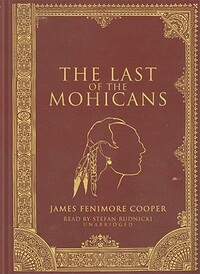Take a photo of a barcode or cover
adventurous
tense
medium-paced
Plot or Character Driven:
Plot
Strong character development:
No
Loveable characters:
Yes
Diverse cast of characters:
Yes
Flaws of characters a main focus:
No
challenging
slow-paced
Plot or Character Driven:
Plot
Strong character development:
No
Loveable characters:
Complicated
Diverse cast of characters:
Yes
Flaws of characters a main focus:
No
Cooper writes in the language of his day. I felt like i was there not only because of the details and descriptions but because he writes in old English.
Really disappointing book. Why is this a classic of American literature? It is written in a childish way, characters are not at all believable or interesting. Watch movie instead.
This book is begging for a rewrite. I like the setting and some of the characters, but the prose is absolutely ludicrous, even for the time period, and the plot doesn't seem to have been thought out at all. I enjoyed it, but it's objectively not a good book.
adventurous
challenging
dark
emotional
informative
mysterious
sad
tense
medium-paced
Plot or Character Driven:
Plot
Strong character development:
No
Loveable characters:
Yes
Diverse cast of characters:
Complicated
Flaws of characters a main focus:
Yes
The first Great American Novel by the first Great American Novelist.
Coming up on two hundred years old, The Last of the Mohicans is a clinical exhibition of what the word "timeless" means as it pertains to American literature. When I picked the book up, I was not aware of the fact that it is also a historical novel, in fact my only familiarity of the titled subject matter was that I oft gamble at a casino called the Mohegan Sun and that Kendrick Lamar rapped "Look inside the eyes of the last Mohicans survived" on Power Circle the summer after I graduated from high school.
Derided by contemporary critics as wordy, the unnecessary descriptors dotting each passage were received warmly by me. There is a distinctly American facet to them, and I found them--even the antiquities among them--appropriate. Much more so than other classics which I've always considered a slog undertaken mainly to achieve an additional notch in my belt of mental dexterity (or perhaps a feather in such a cap). It was as if the novel was penned by a great-great-grandfather. For this reason, I steadfastly declare it as the bedrock of the literary tradition of the country I call home.
It is a story best enjoyed with some guidance such as a plot summary for each chapter and a preface communicating an understanding of the French and Indian war as well as the singular historical event that is central to the plot. Such guidance cast aside, the story flows remarkably well for its age. However, I'd debate any notion of this being "guy book" because it's as much about adventure as it is about love and as much about love as it is about the regularities of the natural world--specifically the wilderness surrounding Lake George. I loved the book, and it is no wonder that it is credited with establishing the trope of the wise, stoic Indian:
"'Tell me, is Tamenund a father?'
The old man looked down upon her from his elevated stand with a benignant smile on his wasted countenance, and then casting his eyes slowly over the whole assemblage, he answered:
'Of a nation.'"
Coming up on two hundred years old, The Last of the Mohicans is a clinical exhibition of what the word "timeless" means as it pertains to American literature. When I picked the book up, I was not aware of the fact that it is also a historical novel, in fact my only familiarity of the titled subject matter was that I oft gamble at a casino called the Mohegan Sun and that Kendrick Lamar rapped "Look inside the eyes of the last Mohicans survived" on Power Circle the summer after I graduated from high school.
Derided by contemporary critics as wordy, the unnecessary descriptors dotting each passage were received warmly by me. There is a distinctly American facet to them, and I found them--even the antiquities among them--appropriate. Much more so than other classics which I've always considered a slog undertaken mainly to achieve an additional notch in my belt of mental dexterity (or perhaps a feather in such a cap). It was as if the novel was penned by a great-great-grandfather. For this reason, I steadfastly declare it as the bedrock of the literary tradition of the country I call home.
It is a story best enjoyed with some guidance such as a plot summary for each chapter and a preface communicating an understanding of the French and Indian war as well as the singular historical event that is central to the plot. Such guidance cast aside, the story flows remarkably well for its age. However, I'd debate any notion of this being "guy book" because it's as much about adventure as it is about love and as much about love as it is about the regularities of the natural world--specifically the wilderness surrounding Lake George. I loved the book, and it is no wonder that it is credited with establishing the trope of the wise, stoic Indian:
"'Tell me, is Tamenund a father?'
The old man looked down upon her from his elevated stand with a benignant smile on his wasted countenance, and then casting his eyes slowly over the whole assemblage, he answered:
'Of a nation.'"
adventurous
challenging
tense
slow-paced
Plot or Character Driven:
Plot
Strong character development:
No
Loveable characters:
No
Diverse cast of characters:
Yes
Flaws of characters a main focus:
No
Very old book, therefore unsurprisingly very very stuffy. The action scenes are where it truly excels though, and you could probably argue that they make the long and bloated book worth it, if you can deal with these old things better than I can.
Moderate: Gun violence, Violence
My early efforts in reading US literature (Cooper, Hawthorne, Crane, Melville) led me to abandon it as dry and inartistic, so I escaped to Britain and the Continent instead. Plainly written, overstated, and lacking in the introspection I had come to expect in 19th century fiction. Twain, of course, is the major exception here.






